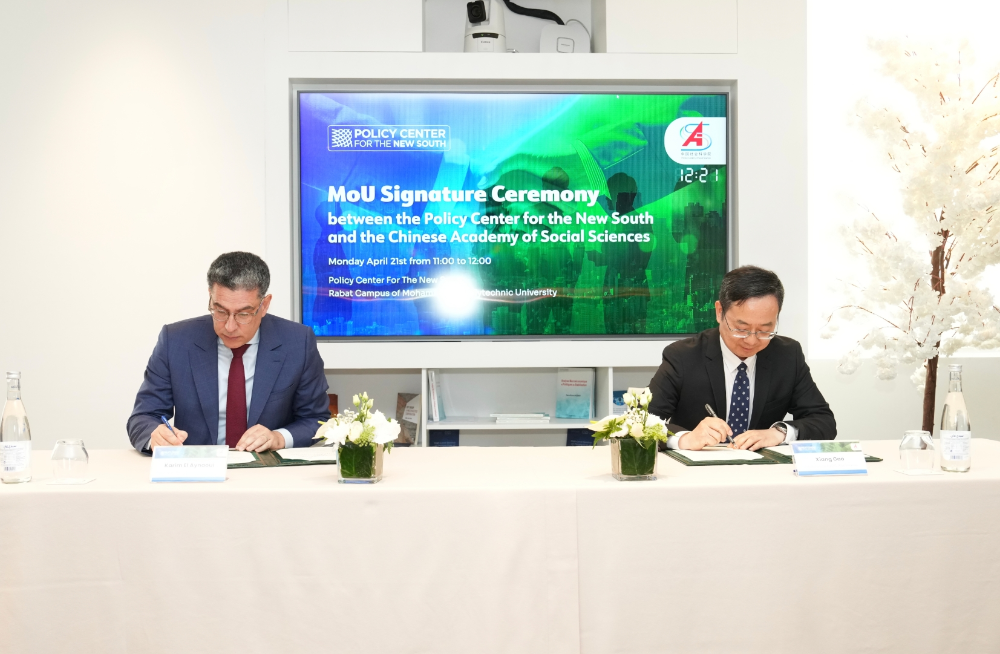


On April 21, Gao Xiang, president of the Chinese Academy of Social Sciences, signs a Memorandum of Understanding between the Chinese Academy of Social Sciences and the Policy Center for the New South with Karim El Aynaoui, executive president of the Policy Center for the New South in Morocco. Photo: Wang Zhou/CSSN
RABAT—On April 21, Gao Xiang, president of the Chinese Academy of Social Sciences (CASS), led a delegation to Rabat, the capital of Morocco. During the visit, he held meetings with Karim El Aynaoui, executive president of the Policy Center for the New South (PCNS), and Fathallah Oualalou, former Moroccan Minister of Economy and Finance, engaging in in-depth academic exchanges centered on institutional building + people-to-people and cultural interactions.
During his meeting with Karim El Aynaoui at PCNS, Gao and El Aynaoui signed Memorandum of Understanding between CASS and PCNS, with the aim of jointly establishing a China-Africa Research Center in Morocco. Gao noted that the “Global South,” represented by China and Africa, is experiencing dynamic growth, profoundly influencing the course of world history. China was the first country to publicly support the African Union’s accession to the G20 and to advocate for a stronger African voice in global governance. As fellow travelers on the path to modernization, China and Africa have set a distinguished example for the creation of a new type of international relations.
Gao emphasized that China and Morocco enjoy a long-standing friendship. As a key gateway to Africa and a civilizational bridge to the Arab world, Morocco has consistently been a sincere partner of China within the Global South. In November 2024, Chinese President Xi Jinping met with Moroccan Crown Prince Moulay El Hassan, injecting strong momentum into the bilateral relationship. The contemporary era is the most complex and rapidly evolving in human history, rendering the guidance of knowledge-based rationality and humanistic spirit imperative. CASS has long attached great importance to African studies, focusing on advancing research on China-Africa relations, Belt and Road cooperation, the Global South, and the building a community with a shared future for mankind. It maintains close academic ties with Morocco and other African countries. Gao praised PCNS as an influential, world-class think tank and emphasized that cooperation between CASS and PCNS carries dual significance: promoting global civilizational exchange while safeguarding peace and development. He proposed three specific areas for deepening this cooperation: advancing the establishment of the China-Africa Research Center within the framework of the Memorandum of Understanding; strengthening think tank dialogues by focusing on key issues; and enhancing research on and dissemination of the modernization paths of China and Morocco by drawing on shared development experiences.
El Aynaoui warmly welcomed the CASS delegation and voiced strong support for Gao’s proposals. He stated that PCNS highly values its cooperation with CASS and that the Memorandum of Understanding has established a framework for future collaboration. PCNS looks forward to the continued development of cooperative projects between the two institutions.
Following the meeting, Gao presented PCNS with the French edition of the first four volumes of Xi Jinping: The Governance of China.
During his meeting with Fathallah Oualalou, Gao commended Oualalou’s long-standing efforts in advancing China-Morocco friendship and his important contributions to the inheritance and development of the traditional bond between China and Africa. As the world’s largest developing country, China, alongside Africa—the continent with the greatest concentration of developing nations—has propelled cooperation that aligns with the historic trend of the Global South rising collectively. Morocco’s rich cultural heritage and strategic location position it as an important partner. Gao stressed that by promoting traditional friendly cooperation through mutual learning between civilizations, China and Morocco will contribute to the steady advancement of China-Africa friendship. Gao expressed hope that Oualalou would continue his support for China-Morocco friendship, jointly building an all-weather China-Africa community of shared future for the new era.
Oualalou emphasized that Morocco-China friendship has deep historical roots, with the two countries sharing notable similarities in their fine traditional cultures, historical trajectories, and current development endeavors. He praised China’s achievements in reform and opening up, noting that they represent a development miracle that offers valuable lessons for Morocco’s pursuit of autonomous development. As the pace of global change accelerates, he observed, Africa-China cooperation—supported by Morocco-China cooperation—has helped overcome the obstacles posed by conservatism and hegemony on human development, fostering a path of win-win cooperation, mutual benefit, and shared development amid an increasingly multipolar world. The signing of the Memorandum of Understanding between PCNS and CASS marks a new chapter in the cultural and people-to-people exchanges between Morocco and China, which will undoubtedly provide strong intellectual support for the flourishing Africa-China friendship.